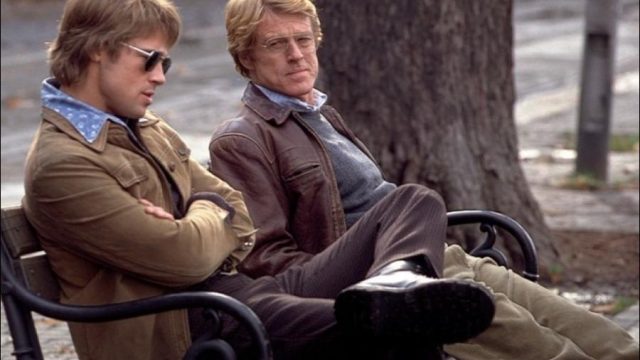It feels like fate always wanted to have Robert Redford and Brad Pitt in the same movie together, especially with them playing variations on a theme. Tony Scott’s Spy Game handles them with aplomb, casting Redford as Nathan Muir, a career spy on the verge of retiring from the CIA, and Pitt as Tom Bishop, Muir’s former recruit and estranged protégé. Muir has practiced ruthlessness for years, and Redford plays him as a man whose temperature never seems to rise; he’s spent his career sharply observing and manipulating the world around him and now, at the end, he’s cashing in all those skills at the same time as his bosses are turning them back on him. It’s hard for them to know what he’s thinking. They can only watch to see what he does–and, unlike him, they’re not good enough at it to catch everything. Watching Muir string them along for the entire film, playing cat-and-mouse with them while sitting there calmly in the same room half the time, is a delight.
The reason for Muir’s cat-and-mouse games is clear to us from the beginning. Bishop has been captured and is being held in a Chinese prison. The U.S. has twenty-four hours to claim him, or he’ll be executed–and since Bishop’s op was an unauthorized, personal attempt to liberate a prisoner, the CIA is willing to leave him on the chopping block. Muir, however, isn’t. There’s no particular surprise here, in terms of Muir turning out to have a soft spot for the man he recruited and spent years training and then handling in the field, but Scott–and Redford and Pitt, in self-contained but warm and nuanced performances–develops the tension nicely all the same, with the question of how Muir will extricate Bishop running parallel to a flashback narrative about how their relationship first developed and then deteriorated. The movie has to first convince us that Muir has lived his whole life by a kind of professional spy code–you use assets, they don’t use you; you burn them and walk away if that’s what it takes–and then convince you that he’s willing to blow all that up for Bishop’s sake; it’s to its credit that I, at least, believed both aspects completely. It helps that Scott and Redford are willing to develop Muir in some genuinely unnerving ways: one of the key details of his arc with Bishop is the fact that Muir recruited him partly by strategically isolating him, fucking with his life until he can appear as an especially welcome friendly face. It’s not nice, and that lack of niceness is important.
So: two icons of blond handsomeness, at two different stages in their career, playing two men with a complex relationship to each other, also at two different stages in their career, in a smoothly paced and cleverly constructed thriller. These are traditional Hollywood pleasures, served up well. If you don’t have a soft spot for that kind of thing, you might not like it–the moral ambiguity is still Hollywood-level moral ambiguity; the tension never includes the threat that Muir will decide it’s not worth the trouble and risk to get Bishop out–but if you do, and if you hanker for Cold War spycraft and satisfying popcorn-crunching stories of duplicity and honor in dishonorable professions, this may please you as much as it pleased me.

